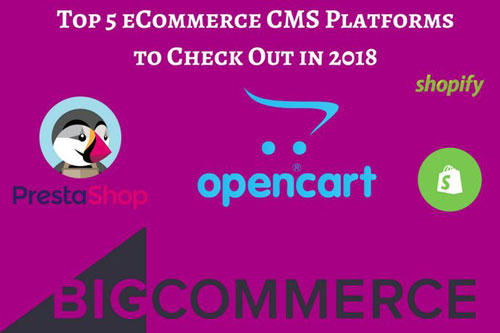
Ecommerce is the fastest growing industry online. Selling everything from apparel to electronics, ecommerce sites have taken off due to their convenience and economy. As a result, the competition between these sites is intense. Every site should not only develop a user-friendly experience, it should be supported by a highly efficient CMS.
With constantly moving inventory and the need for a dynamic site, content management is an absolutely essential element in eCommerce. An ideal CMS should work at both ends of the spectrum – ensuring a smooth shopping experience for the customer while creating an impressive support system for the seller. There are two types of ecommerce platforms to choose from: hosted and self-hosted ecommerce platforms.
Hosted e-Commerce CMS Platforms
1. Shopify
With constantly moving inventory and the need for a dynamic site, content management is an absolutely essential element in eCommerce. An ideal CMS should work at both ends of the spectrum – ensuring a smooth shopping experience for the customer while creating an impressive support system for the seller. There are two types of e-commerce platforms to choose from: hosted and self-hosted e-commerce platforms, with 3PL shopify offering integrated logistics solutions for seamless operations.
The user experience is made equally efficient on both ends. The shopper experience is fast and efficient, while sellers can also easily track purchases and trends. The platform also supports multiple payment options as required by any ecommerce website today.
2. Big Commerce
One of the most popular ecommerce platforms across the globe, BigCommerce supports a range of businesses in equally diverse locations. It has an efficient and easy-to-use CMS, which can be set up at any time. User-friendly admin offers ample flexibility to manage products and services. There are multiple options in marketing methods as well as drag-and-drop widgets.
Various tools and applications help you customize the site. As a CMS, BigCommerce has many advantages that make it one of the top platforms, including an SEO friendly framework, BigCommerce offers an SEO-friendly framework, making it ideal for businesses partnering with seo services consultants for growth. built-in analytics, options for social sharing, and a number of customer interaction tools. BigCommerce, as a CMS, offers strong advantages like an SEO-friendly framework, built-in analytics, social sharing, customer tools, and support for seo for hotels.
Self-hosted3. Magetno
Among self-hosted platforms, Magento stands out for its flexibility — but only when paired with the right infrastructure. Using a dedicated Magento hosting ensures you get the performance benefit of self-hosting without uptime or speed compromises. Magento may well emerge as the winner. This open-source platform prides itself on its agility and it is this feature that gives it the flexibility it needs in today's dynamic world of ecommerce. The popularity of Magento web development services has given it its own stregnth. It now has the ecosystem more than 150,000 developers as well as over 300 trained solution partners.
CMS offers tested plug-ins, allowing users complete flexibility in managing their appearance, content and functionality. When paired with reliable Magento web hosting, the platform ensures optimal performance, scalability, and security. Its mobility across devices, flexible pricing (including free versions), automatic updates, easy-to-use functions and advanced SEO have made it the most popular eCommerce CMS in the world today.
4. Open Cart
The fact that OpenCart is free is undoubtedly one of its USPs, but it is not the only one. The open-source platform offers free updates and no monthly fees. But it's also fairly easy to develop and use - two essential requirements for a self-hosted CMS. Based on the MVC pattern, OpenCart only requires knowledge of PHP and MySQL. Best UX with easy to use dashboard, which is very user friendly. In addition to its own support team, OpenCart also has a pretty active community.
5. PrestaShop
Coupled with almost zero development costs, PrestaShop is one of the easiest platforms to work with, thanks to its easy-to-use administrative dashboard. It is easy to follow and allows you complete customization. Backed by a website builder, it has a number of tools and features, which add to its functionality. But PrestaShop is also geared towards more modern marketing requirements – mobile-friendly as well as SEO support.
It allows for multiple payment options and easy checkout. With the right add-ons, you can even integrate it with other eCommerce sites to expand your market! Today the requirements for a viable CMS are many, and there are many platforms, fighting to get ahead of the pack. Finally, choices can be made for many purposes, from flexibility and ease of use to plain old choice. But here are our top 5 picks in the CMS platforms you saw in detail above.
Recent Blogs
Categories



